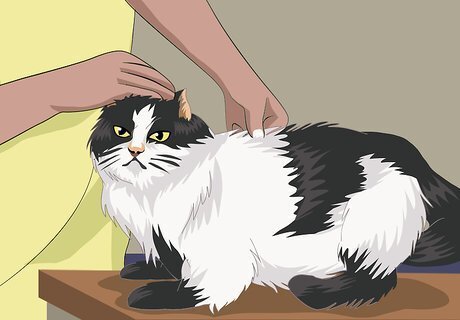
views
Setting Your Cat Up For a Quiet Night

Create a comfortable sleeping space for your cat. You should set up multiple sleeping areas for your cat throughout your house or in a room designated for your cat. This will discourage the cat from coming to your room at night for snuggles or attention. Lay out pillows, blankets, and nesting materials so your cat can choose what sleeping space it likes. Consider putting up room-darkening curtains or blackout curtains in your cat's space. Since cats are most active in early morning and at twilight, the darkness may trick your cat into sleeping longer.

Play with your cat throughout the day. Your cat may be more active in the evening if it doesn't get enough physical activity throughout the day. Try to play with your cat for 5 to 10 minutes several times a day. If you see your cat sleeping for several hours during the day, wake it up and play with it for a few minutes. Wearing your cat out will help it sleep better at night. Try giving your cat food puzzles to play with before bedtime. This will use up some of your cat's energy and give it a last snack before bedtime which may prevent it from waking you at night for food.

Feed your cat later in the evening. If your cat is in the habit of eating its dinner in the early evening, begin shifting its dinner closer to its bedtime. This will keep your cat fuller longer so it won't wake you in the middle of the night looking for food. Instead of making a sudden dinner time change, gradually shift its meal time back by half an hour at a time. You could also feed less food at dinner time and reserve the rest to give your cat as a snack before bed.

Set out breakfast for your cat. If your cat is only waking you at night so you'll feed it, you may want to just set out its breakfast before you go to bed. You could also use a timed meal dispenser if you're worried the cat will eat its breakfast too early. For example, you could set the dispenser to feed your cat every morning at the same time. This way, it learns to associate food with the dispenser and it won't wake you. If you choose to give the cat its breakfast in the morning, wait a while after you wake up. This way, the cat doesn't associate waking you up with getting its food.

Keep your cat out of your room. If you give your cat access to your room and it continues to wake you, consider closing your door so it can't get in. You may find that closing your door isn't enough and your cat continues to scratch or paw at your door. This is why it may be important to give your cat its own sleeping space. If you choose to keep your door closed but give your cat free range of the house, be prepared to deal with several nights of your cat scratching at your door. Ignore the behavior so your cat learns to find somewhere else to sleep.

Consider giving the cat melatonin. Once you've changed your cat's sleeping environment and schedule, your cat's night demands should drop off after a week or two. If your cat is still waking you, talk to the veterinarian about giving your cat melatonin, a natural sleep aid. Giving your cat melatonin in the evening can help it sleep longer through the night before waking you. Melatonin may be a good option if your cat wakes you multiple times in the night.
Responding to Your Noisy Cat

See if your cat is alright. If your cat wakes you up once in a while, you should check to ensure that it's feeling alright. You may need to take the cat to the vet if it seems in pain or has been sick, especially if your cat doesn't usually bother you in the middle of the night. If your cat is fine and repeatedly wakes you, you'll need to start ignoring its night wakings.

Determine why your cat woke you. Once you've ruled out any medical concerns or issues that could be keeping your cat up, figure out why the cat is waking you. Your cat may want your snuggles or attention. Or your cat may be hungry and expect you to feed it. Determining why your cat is waking you will help you prevent future night wakings. Don't forget to check your cat's sleep environment for anything that could bother your cat. Your cat may not like a bright light shining into the room or may be upset if another cat is outside meowing.

Ignore your cat. If your cat doesn't have any medical conditions and you've ruled out something bothering your cat, you'll need to ignore the night waking behavior. Completely ignoring your cat's bids for attention will teach it to stop waking you. Remember that even negative attention is attention. For example, you shouldn't even be in the habit of getting up and moving your cat or closing your door. Your cat will see this as a response and it will continue to wake you at night.

Be consistent. It may be difficult to hear your cat whine for your attention and to ignore it, but you must if you want the behavior to end. It's important to consistently ignore the cat so it doesn't expect any sort of response from you. Keep in mind that your cat's whining will probably get worse right before your cat stops waking you. Just continue to ignore the behavior. It will take one or two weeks for your cat to learn that you won't give it food or attention when it wakes you at night.


















Comments
0 comment